
Dorothy (opera)
Encyclopedia
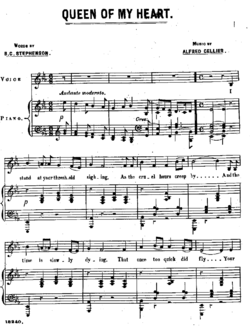
Comic opera
Comic opera denotes a sung dramatic work of a light or comic nature, usually with a happy ending.Forms of comic opera first developed in late 17th-century Italy. By the 1730s, a new operatic genre, opera buffa, emerged as an alternative to opera seria...
in three acts with music by Alfred Cellier
Alfred Cellier
Alfred Cellier was an English composer, orchestrator and conductor.In addition to conducting and music directing the original productions of several of the most famous Gilbert and Sullivan works and writing the overtures to some of them, Cellier conducted at many theatres in London, New York and...
and a libretto by B. C. Stephenson
B. C. Stephenson
Benjamin Charles Stephenson or B. C. Stephenson was an English dramatist, lyricist and librettist. After beginning a career in the civil service, he started to write for the theatre, using the pen name "Bolton Rowe". He was author or co-author of several long-running shows of the Victorian theatre...
. The story involves a rake who falls in love with his disguised fiancée.
It was first produced at the Gaiety Theatre
Gaiety Theatre, London
The Gaiety Theatre, London was a West End theatre in London, located on Aldwych at the eastern end of the Strand. The theatre was established as the Strand Musick Hall , in 1864 on the former site of the Lyceum Theatre. It was rebuilt several times, but closed from the beginning of World War II...
in London
London
London is the capital city of :England and the :United Kingdom, the largest metropolitan area in the United Kingdom, and the largest urban zone in the European Union by most measures. Located on the River Thames, London has been a major settlement for two millennia, its history going back to its...
on in 1886. After a rocky start, it was revised and transferred to the Prince of Wales Theatre
Prince of Wales Theatre
The Prince of Wales Theatre is a West End theatre on Coventry Street, near Leicester Square in the City of Westminster. It was established in 1884 and rebuilt in 1937, and extensively refurbished in 2004 by Sir Cameron Mackintosh, its current owner...
later that year and then transferred to the Lyric Theatre
Lyric Theatre (London)
The Lyric Theatre is a West End theatre on Shaftesbury Avenue in the City of Westminster.Designed by architect C. J. Phipps, it was built by producer Henry Leslie with profits from the Alfred Cellier and B. C. Stephenson hit, Dorothy, which he transferred from the Prince of Wales Theatre to open...
in 1888, where it played until 1889. The piece had an initial run of 931 performances, breaking the record for the longest-running musical theatre production in history and holding this record until the run of the musical play A Chinese Honeymoon
A Chinese Honeymoon
A Chinese Honeymoon is a musical comedy in two acts by George Dance, with music by Howard Talbot and additional music by Ivan Caryll and others, and additional lyrics by Harry Greenbank and others...
in the early 1900s.
Dorothy also toured in Britain, America and Australia and enjoyed numerous revivals until at least 1908. The piece was popular with amateur theatre groups, particularly in Britain, until World War II. The show's hit songs included the ballad "Queen of My Heart", "Be Wise In Time", "Hark For'ard!", "With A Welcome To All", and "The Time Has Come."
Background
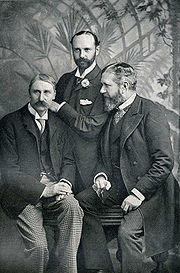
Comic opera
Comic opera denotes a sung dramatic work of a light or comic nature, usually with a happy ending.Forms of comic opera first developed in late 17th-century Italy. By the 1730s, a new operatic genre, opera buffa, emerged as an alternative to opera seria...
" like the popular Gilbert and Sullivan
Gilbert and Sullivan
Gilbert and Sullivan refers to the Victorian-era theatrical partnership of the librettist W. S. Gilbert and the composer Arthur Sullivan . The two men collaborated on fourteen comic operas between 1871 and 1896, of which H.M.S...
operas on the London stage at the same time, Dorothy was a key forerunner of the Edwardian musical comedy
Edwardian Musical Comedy
Edwardian musical comedies were British musical theatre shows from the period between the early 1890s, when the Gilbert and Sullivan operas' dominance had ended, until the rise of the American musicals by Jerome Kern, Rodgers and Hart, George Gershwin and Cole Porter following World War I.Between...
, bearing many of the attributes of that genre. Its libretto is more farcical than W. S. Gilbert
W. S. Gilbert
Sir William Schwenck Gilbert was an English dramatist, librettist, poet and illustrator best known for his fourteen comic operas produced in collaboration with the composer Sir Arthur Sullivan, of which the most famous include H.M.S...
's satiric libretti, revolving around mistaken identities and topical humour instead of topsy-turvy plot absurdities. Dorothy anticipated George Edwardes
George Edwardes
George Joseph Edwardes was an English theatre manager of Irish ancestry who brought a new era in musical theatre to the British stage and beyond....
's musical comedy hits of the 1890s and 1900s, and its remarkable success showed Edwardes and other theatre managers that audiences were ready for a shift towards the more topical pieces that soon dominated the musical theatre stage.
In 1885, Cellier had composed a song, "There once was a time, my darling", for a piece produced by Edwardes, Little Jack Sheppard
Little Jack Sheppard
Little Jack Sheppard is a burlesque melodrama written by Henry Pottinger Stephens and William Yardley, with music by Meyer Lutz, with songs contributed by Florian Pascal, Corney Grain, Arthur Cecil, Michael Watson, Henry J. Leslie, Alfred Cellier and Hamilton Clarke...
(1885). Cellier, who had been a lieutenant of Arthur Sullivan
Arthur Sullivan
Sir Arthur Seymour Sullivan MVO was an English composer of Irish and Italian ancestry. He is best known for his series of 14 operatic collaborations with the dramatist W. S. Gilbert, including such enduring works as H.M.S. Pinafore, The Pirates of Penzance and The Mikado...
, re-purposed much of the music for Dorothy from his unsuccessful comic opera of ten years earlier, Nell Gwynne. Though a flop, the music of Nell Gwynne had been praised. Stephenson wrote new lyrics and a libretto to fit the music. He wrote a well-crafted play, with literary echoes of familiar themes reminiscent of Jane Austen
Jane Austen
Jane Austen was an English novelist whose works of romantic fiction, set among the landed gentry, earned her a place as one of the most widely read writers in English literature, her realism and biting social commentary cementing her historical importance among scholars and critics.Austen lived...
's Emma, yet with a more modern style, suggesting its eighteenth-century setting lightly rather than with the archaic literary tone common in Victorian drama. Shortly before the première, Cellier's doctors advised him not to spend the winter in England, and he left for Australia. In his absence it became clear that the opera needed a big romantic ballad, and Cellier's publisher suggested using one of his existing songs, "Queen of my Heart", which was interpolated into the piece and became a huge success. The sheet music sold over 40,000 copies, and the popularity of the song saved the opera from failure.
Production and aftermath
The piece opened at the Gaiety TheatreGaiety Theatre, London
The Gaiety Theatre, London was a West End theatre in London, located on Aldwych at the eastern end of the Strand. The theatre was established as the Strand Musick Hall , in 1864 on the former site of the Lyceum Theatre. It was rebuilt several times, but closed from the beginning of World War II...
on 25 September 1886. It starred Marion Hood
Marion Hood
Marion Hood was an English soprano who performed in opera and musical theatre in the last decades of the 19th century...
in the title role opposite the popular Hayden Coffin, with comedians Arthur Williams
Arthur Williams (actor)
Arthur Williams was an English actor, singer and playwright best remembered for his roles in comic operas, musical burlesques and Edwardian musical comedies...
, Furneaux Cook
Furneaux Cook
Furneaux Cook , born John Furneaux Cook, was an English opera singer and actor best known for baritone roles in the comic operas of Gilbert and Sullivan and Alfred Cellier on the London stage. Cook appeared on stage for over 30 years in London, the British provinces and America.-Life and...
and John Le Hay
John Le Hay
John Le Hay was the stage name of John Healy was an Irish-born singer and actor best remembered for his portrayal of the comic baritone roles in the Savoy Operas.-Early career:...
. This was the first production at the Gaiety by new managing director (and later owner) of the theatre, George Edwardes
George Edwardes
George Joseph Edwardes was an English theatre manager of Irish ancestry who brought a new era in musical theatre to the British stage and beyond....
, who misjudged his audience. The Gaiety was then known for burlesque, and its audiences were not looking for Gilbert and Sullivan
Gilbert and Sullivan
Gilbert and Sullivan refers to the Victorian-era theatrical partnership of the librettist W. S. Gilbert and the composer Arthur Sullivan . The two men collaborated on fourteen comic operas between 1871 and 1896, of which H.M.S...
style comic opera. The piece received lukewarm notices, and neither the music nor the libretto attracted critical praise. The Times
The Times
The Times is a British daily national newspaper, first published in London in 1785 under the title The Daily Universal Register . The Times and its sister paper The Sunday Times are published by Times Newspapers Limited, a subsidiary since 1981 of News International...
wrote, "Gentility reigns supreme, and with it unfortunately also a good deal of the refined feebleness and the ineptitude which are the defects of that quality." After a few months, Edwardes sold the production to his accountant, Henry Leslie.
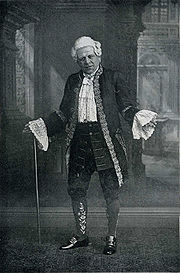
Marie Tempest
Dame Marie Tempest DBE was an English singer and actress known as the "queen of her profession".Tempest became the most famous soprano in late Victorian light opera and Edwardian musical comedies. Later, she became a leading comic actress and toured widely in North America and elsewhere...
, who took over the title role from the ailing Hood and became one of musical theatre's biggest stars. The piece reopened at the Prince of Wales Theatre
Prince of Wales Theatre
The Prince of Wales Theatre is a West End theatre on Coventry Street, near Leicester Square in the City of Westminster. It was established in 1884 and rebuilt in 1937, and extensively refurbished in 2004 by Sir Cameron Mackintosh, its current owner...
on 20 December 1886 and transferred to the Lyric Theatre
Lyric Theatre (London)
The Lyric Theatre is a West End theatre on Shaftesbury Avenue in the City of Westminster.Designed by architect C. J. Phipps, it was built by producer Henry Leslie with profits from the Alfred Cellier and B. C. Stephenson hit, Dorothy, which he transferred from the Prince of Wales Theatre to open...
on 17 December 1888, where it closed on 6 April 1889. Marie Tempest
Marie Tempest
Dame Marie Tempest DBE was an English singer and actress known as the "queen of her profession".Tempest became the most famous soprano in late Victorian light opera and Edwardian musical comedies. Later, she became a leading comic actress and toured widely in North America and elsewhere...
took over in the title role, and Florence Perry
Florence Perry
Florence Perry was an English opera singer and actress best known for her performances with the D'Oyly Carte Opera Company.-Biography:...
made her London stage debut in 1887 in the role of Phyllis Tuppitt.
The revised Dorothy became a great success at the box office and had an initial run of 931 performances, breaking the record for the longest-running musical theatre production in history and holding this record until the run of the musical play A Chinese Honeymoon
A Chinese Honeymoon
A Chinese Honeymoon is a musical comedy in two acts by George Dance, with music by Howard Talbot and additional music by Ivan Caryll and others, and additional lyrics by Harry Greenbank and others...
in the early 1900s. It was also the second longest known run for a stage production of any kind, after Our Boys
Our Boys
Our Boys is a comedy in three acts written by Henry James Byron, first performed in London on 16 January 1875 at the Vaudeville Theatre. Until it was surpassed by the run of Charley's Aunt in the 1890s, it was the world's longest-running play, up to that time, with 1,362 performances until April...
, an 1875 vaudeville play, until both were surpassed by the run of Charley's Aunt
Charley's Aunt
Charley's Aunt is a farce in three acts written by Brandon Thomas. It broke all historic records for plays of any kind, with an original London run of 1,466 performances....
in the 1890s. The show's hit songs included the ballad "Queen of My Heart", "Be Wise In Time", "Hark For'ard!", "With A Welcome To All", and "The Time Has Come." Henry Leslie made so much money from Dorothy that he was able to build the Lyric Theatre
Lyric Theatre (London)
The Lyric Theatre is a West End theatre on Shaftesbury Avenue in the City of Westminster.Designed by architect C. J. Phipps, it was built by producer Henry Leslie with profits from the Alfred Cellier and B. C. Stephenson hit, Dorothy, which he transferred from the Prince of Wales Theatre to open...
, where the show transferred in 1888. The success of the show also spurred revivals of some of Cellier's earlier works. Some critics reconsidered their earlier condemnation, the work became regarded as a classic Victorian piece, and the initially despised plot was traced seriously back to the Restoration playwrights David Garrick
David Garrick
David Garrick was an English actor, playwright, theatre manager and producer who influenced nearly all aspects of theatrical practice throughout the 18th century and was a pupil and friend of Dr Samuel Johnson...
and Aphra Behn
Aphra Behn
Aphra Behn was a prolific dramatist of the English Restoration and was one of the first English professional female writers. Her writing contributed to the amatory fiction genre of British literature.-Early life:...
, and to Oliver Goldsmith
Oliver Goldsmith
Oliver Goldsmith was an Irish writer, poet and physician known for his novel The Vicar of Wakefield , his pastoral poem The Deserted Village , and his plays The Good-Natur'd Man and She Stoops to Conquer...
and even Shakespeare
William Shakespeare
William Shakespeare was an English poet and playwright, widely regarded as the greatest writer in the English language and the world's pre-eminent dramatist. He is often called England's national poet and the "Bard of Avon"...
.
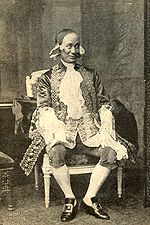
Decima Moore
Lilian Decima, Lady Moore-Guggisberg, CBE , better known by her stage name Decima Moore, was an English singer and actress, known for her performances in soprano roles with the D'Oyly Carte Opera Company and in musical comedies. She was the youngest of ten siblings...
played the title role in the 1892 revival. Courtice Pounds
Courtice Pounds
Charles Courtice Pounds , better known by the stage name Courtice Pounds, was an English singer and actor known for his performances in the tenor roles of the Savoy Operas with the D'Oyly Carte Opera Company and his later roles in Shakespeare plays and Edwardian musical comedies.As a young member...
played Wilder on a 1900 provincial tour. There was also a New York run from 5 November 1887 to April 1888 starring Lillian Russell
Lillian Russell
Lillian Russell was an American actress and singer. She became one of the most famous actresses and singers of the late 19th century and early 20th century, known for her beauty and style, as well as for her voice and stage presence.Russell was born in Iowa but raised in Chicago...
as the title character, and the show was revived in America until about 1900. A successful tour of Australia also began in 1887, with Leonora Braham
Leonora Braham
Leonora Braham , born Leonora Lucy Abraham, was an English opera singer and actress primarily known as the creator of principal soprano roles in the Gilbert and Sullivan comic operas....
making her Australian debut, followed by an 1888 production starring Nellie Stewart
Nellie Stewart
Nellie Stewart was an Australian actress and singer, known as "Our Nell" and "Sweet Nell".Born into a theatrical family, Stewart began acting as a child. As a young woman, she built a career playing in operetta and Gilbert and Sullivan operas. In the mid-1880s, she began a long relationship with...
and more revivals into the 1890s. John D'Auban
John D'Auban
Frederick John D'Auban was an English dancer, choreographer and actor of the Victorian and Edwardian eras. Famous during his lifetime as the ballet-master at the Theatre Royal, Drury Lane, he is best remembered as the choreographer of many of the Gilbert and Sullivan operas.After performing as a...
choreographed a West End revival in 1892 at the Trafalgar Square Theatre
Duke of York's Theatre
The Duke of York's Theatre is a West End Theatre in St Martin's Lane, in the City of Westminster. It was built for Frank Wyatt and his wife, Violet Melnotte, who retained ownership of the theatre, until her death in 1935. It opened on 10 September 1892 as the Trafalgar Square Theatre, with Wedding...
.
The story of Dorothy reflects touches of cynicism, early feminism, and utilises plenty of mistaken-identity and social-class-distinction comic situations. Elements of the story are derived from the 1847 opera Martha
Martha (opera)
Martha, oder Der Markt zu Richmond is a 'romantic comic' opera in four acts by Friedrich von Flotow, set to a German libretto by Friedrich Wilhelm Riese and based on a story by Jules-Henri Vernoy de Saint-Georges....
by Friedrich von Flotow
Friedrich von Flotow
Friedrich Adolf Ferdinand, Freiherr von Flotow was a German composer. He is chiefly remembered for his opera Martha, which was popular in the 19th century....
, a tale of two wealthy young ladies who dress as peasants to go to the fair, fall in love with two young farmers and, after exploits, identity-confusion and ring-exchanges, are reunited with them.
Roles and London cast
- Sir John Bantam, "The Squire" of Chanticleer Hall (baritoneBaritoneBaritone is a type of male singing voice that lies between the bass and tenor voices. It is the most common male voice. Originally from the Greek , meaning deep sounding, music for this voice is typically written in the range from the second F below middle C to the F above middle C Baritone (or...
) – Furneaux CookFurneaux CookFurneaux Cook , born John Furneaux Cook, was an English opera singer and actor best known for baritone roles in the comic operas of Gilbert and Sullivan and Alfred Cellier on the London stage. Cook appeared on stage for over 30 years in London, the British provinces and America.-Life and... - Geoffrey Wilder, Sir John Bantam's nephew and heir, a London Gallant (tenorTenorThe tenor is a type of male singing voice and is the highest male voice within the modal register. The typical tenor voice lies between C3, the C one octave below middle C, to the A above middle C in choral music, and up to high C in solo work. The low extreme for tenors is roughly B2...
) – Redfern Hollins; replaced by Ben Davies - Harry Sherwood, Geoffrey Wilder's friend (baritone) – C. Hayden CoffinC. Hayden CoffinCharles Hayden Coffin was an English actor and singer known for his performances in many famous Edwardian musical comedies, particularly those produced by George Edwardes....
- John Tuppitt, Landlord of the "Hop-Pole Inn" – Edward Griffin
- William Lurcher, A Sheriff's Officer (comic baritone) – Arthur WilliamsArthur Williams (actor)Arthur Williams was an English actor, singer and playwright best remembered for his roles in comic operas, musical burlesques and Edwardian musical comedies...
- Tom Strutt (or Tom Grass), A Young Farmer – John Le Hay John Le HayJohn Le Hay was the stage name of John Healy was an Irish-born singer and actor best remembered for his portrayal of the comic baritone roles in the Savoy Operas.-Early career:...
- Dorothy Bantam, Sir John Bantam's Daughter (sopranoSopranoA soprano is a voice type with a vocal range from approximately middle C to "high A" in choral music, or to "soprano C" or higher in operatic music. In four-part chorale style harmony, the soprano takes the highest part, which usually encompasses the melody...
) – Marion HoodMarion HoodMarion Hood was an English soprano who performed in opera and musical theatre in the last decades of the 19th century...
; replaced by Marie TempestMarie TempestDame Marie Tempest DBE was an English singer and actress known as the "queen of her profession".Tempest became the most famous soprano in late Victorian light opera and Edwardian musical comedies. Later, she became a leading comic actress and toured widely in North America and elsewhere... - Lydia Hawthorne, Her Cousin (mezzo-sopranoMezzo-sopranoA mezzo-soprano is a type of classical female singing voice whose range lies between the soprano and the contralto singing voices, usually extending from the A below middle C to the A two octaves above...
) – Florence Dysart; replaced by Edith Chester - Phyllis Tuppitt, The Landlord's Daughter, in love with Tom Strutt (contraltoContraltoContralto is the deepest female classical singing voice, with the lowest tessitura, falling between tenor and mezzo-soprano. It typically ranges between the F below middle C to the second G above middle C , although at the extremes some voices can reach the E below middle C or the second B above...
) – F. Lambeth; replaced by Grace Huntly and then by Florence PerryFlorence PerryFlorence Perry was an English opera singer and actress best known for her performances with the D'Oyly Carte Opera Company.-Biography:... - Lady Betty, A Spinster – J. McNulty; replaced by Florence Neville
- Mrs. Privett, A Widow (non-singing) – Harriet Coveney
- Chorus of Hop-Pickers, Peasants, Guests, Bridesmaids, etc.
Act I
At old John Tuppitt's inn in rural KentKent
Kent is a county in southeast England, and is one of the home counties. It borders East Sussex, Surrey and Greater London and has a defined boundary with Essex in the middle of the Thames Estuary. The ceremonial county boundaries of Kent include the shire county of Kent and the unitary borough of...
, the countryfolk of the neighbourhood of Chanticleer Hall, the property of Squire Bantam, are enjoying themselves on the morning of an autumn day in 1740. Dorothy Bantam, the Squire's daughter, and Lydia Hawthorne, his niece, take the opportunity to dress informally and join in the festivities. They find that Phyllis, Tuppitt's daughter, has promised to marry Tom Strutt, a local man. They try to dissuade her, believing that women should remain free from the fetters of matrimony. The Squire wants Dorothy to marry Geoffrey Wilder, his nephew and heir, whom she has never met and who has been leading a wild life in London.
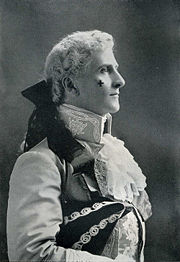
Dorothy and Lydia, their insistence on permanent spinsterhood shaken by the attractions of Wilder and Sherwood, give the two men rings, making them promise never to part with them.
Act II
Squire Bantam is entertaining guests when the arrival of a stranger is announced. This is Lurcher passing himself off as secretary to the Duke of Berkshire. He asks for hospitality for the duke and his friend, Lord Crinkletop, whose carriage has broken down. Wilder (posing as the "duke") and Sherwood (Crinkletop) are welcomed by Bantam. Dorothy and Lydia enter, but the two men do not recognise them as the rustics who enchanted them in Act I. The women play on the susceptibilities of the men. Wilder becomes beguiled by Lydia and Sherwood by Dorothy. Eventually the women succeed in persuading each man to give them the rings that "Abigail" and "Dorcas" gave the other at the inn.The guests retire to rest, and in the dark, Wilder, Sherwood and Lurcher carry out Wilder's scheme. Cloaked and masked, they capture Squire Bantam and tie him up. At the same time, Sherwood binds Wilder. The house is soon roused by the cries; but when the guests reappear they find that the robbers have taken none of Bantam's money, but have, it seems, robbed the "duke" of a large amount (coincidentally equalling the sum of Wilder's debts). Feeling responsible for this misfortune under his roof, Bantam insists on making good the "duke"'s loss.
Act III
Dorothy and Lydia test the fidelity of their two admirers. The men have repented of their temporary infatuations of the previous night and have sent letters to Dorothy and Lydia affirming that they remain devoted to Dorcas and Abigail. By return the men receive challenges to duels, ostensibly from two young gentlemen outraged at their conduct to the two young ladies, but in fact written by Dorothy and Lydia.The young women turn up disguised as men at the appointed site for the duel. They are pleased that Wilder and Sherwood are so dedicated to "Dorcas" and "Abigail" that they will risk their lives in a duel for the sake of their devotion. On the other hand, the ladies are anxious that the duels should not go ahead. Squire Bantam arrives, having learned of the burglary plot from Lurcher. He will forgive his errant nephew if he will consent to marry Dorothy. The ladies overlook the men's temporary wavering of the night before, and the couples are married.
Musical Numbers
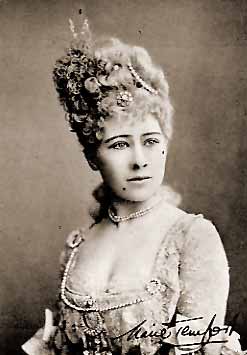
.jpg)
- 1. Opening Chorus and Ballet – "Lads and lasses round about the hop-pole trip"
- 2. Song with Trio – "Be wise in time, Oh Phyllis mine" (Dorothy, Lydia, and Phyllis)
- 3. Quartet – "We're sorry to delay you" (Dorothy, Lydia, Wilder, and Sherwood)
- 4. Ballad – "With such a dainty dame none can compare" (Wilder)
- 5 Quintet – "A father's pride and joy they are" (Dorothy, Lydia, Wilder, Sherwood, and Tuppitt)
- 6. Song and Trio – "I am the Sheriff's faithful man" (Lurcher, Wilder, and Sherwood)
- 7. Quartet – "You swear to be good and true" (Dorothy, Lydia, Wilder, and Sherwood)
- 8. Chorus with Solo – "Under the pump" (Lurcher)
- 9. Act I Finale – "Now take your seats at table spread"
Act II
- 10. Act II Introduction and Country Dance
- 11. Song – "Though born a man of high degree" (Wilder and Chorus)
- 12. Music for the Entrance of Dorothy and Lydia
- 13. Graceful Dance
- 14. Song – "Contentment I give you and all that it brings" (Bantam)
- 15. Septet and Chorus – "Now let's to bed" (Dorothy, Lydia, Wilder, Sherwood, Lurcher, and Bantam)
- 16. Recit and Quartett – "One moment pray" (Dorothy, Lydia, Wilder, and Sherwood)
- 16a. Ballad – "I stand at your threshold sighing" ("Queen of my Heart") (Sherwood)
- 17. Trio – "Are you sure that they are all in bed?" (Wilder, Sherwood, and Bantam)
- 18. Chorus with Dorothy, Lydia, Wilder, Sherwood, Bantam, and Lurcher – "What noise was that"
- 19. Act II Finale – "Hark forward"
Act III
- 20. Act III – Ballet
- 21. Chorus – "Dancing is not what it used to be"
- 22. Ballad – "The time has come when I must yield" (Phyllis)
- 23. Septet and Chorus – "What joy untold to feel at last"
- 24. Act III Finale – "You swore to be good and true"
No. 16a became a successful ballad standard, "Queen of My Heart."
Critical reception
The press praised the music and the original production but had mixed reactions to the performances; they disliked the libretto. The Pall Mall GazettePall Mall Gazette
The Pall Mall Gazette was an evening newspaper founded in London on 7 February 1865 by George Murray Smith; its first editor was Frederick Greenwood...
said, "The story is curiously devoid of any interest, the dialogue is of the weakest, the lyrics have no point.... Mr Cellier's music is worthy a better fate." Other papers agreed: "To put it plainly, the libretto is not worthy of the music." Punch
Punch (magazine)
Punch, or the London Charivari was a British weekly magazine of humour and satire established in 1841 by Henry Mayhew and engraver Ebenezer Landells. Historically, it was most influential in the 1840s and 50s, when it helped to coin the term "cartoon" in its modern sense as a humorous illustration...
wrote, "The music is much better than the plot – not that this is saying much.... I fancy that Herr Meyer Lutz
Meyer Lutz
Wilhelm Meyer Lutz was a German-born English composer and conductor who is best known for light music, musical theatre and burlesques of well-known works....
must have received instructions not to indulge in any of his old frivolous ways, but to conduct the music gravely and sedately – which he did. I was wondering whether he was awake all the time." Many of the critics complained that the libretto was derivative, primarily of She Stoops to Conquer
She Stoops to Conquer
She Stoops to Conquer is a comedy by the Irish author Oliver Goldsmith, son of an Anglo-Irish vicar, first performed in London in 1773. The play is a great favourite for study by English literature and theatre classes in Britain and the United States. It is one of the few plays from the 18th...
.
George Bernard Shaw
George Bernard Shaw
George Bernard Shaw was an Irish playwright and a co-founder of the London School of Economics. Although his first profitable writing was music and literary criticism, in which capacity he wrote many highly articulate pieces of journalism, his main talent was for drama, and he wrote more than 60...
, seeing the piece well into its long run, wrote of his pity for the cast: "Here are several young persons doomed to spend the flower of their years in mechanically repeating the silliest libretto in modern theatrical literature, set to music which, pretty as it is, must pall somewhat on the seven hundred and eighty-eighth performance.... I did not wait for the third act. My companion had all but fallen into the pit from sleep and heaviness of spirit combined.... It is a criminal waste of young lives and young talents." The Times
The Times
The Times is a British daily national newspaper, first published in London in 1785 under the title The Daily Universal Register . The Times and its sister paper The Sunday Times are published by Times Newspapers Limited, a subsidiary since 1981 of News International...
wrote:
By the time of a 1908 revival, The Times had a more favourable view: "It is twenty-one years since Dorothy was produced.... Clearly, it is impossible to bring a cool mind to bear in judgment on Dorothy. It belongs to the golden past; it is enshrined in memory; to hear it is to grow young again. To analyse it or criticize it would be to question the beauty of the ladies with whom we were then in love.... And the pleasantest feeling of all is the conviction that Dorothy completely deserves the admiration we lavished on it. It is one of the most tuneful, most charming, and most shapely of English comic operas."
External links
- A Downloadable Vocal Score
- Dorothy at The Guide to Light Opera and Operetta
- Long Runs in Theatre, a list of records listing the longest runs ever achieved by stage productions of any type
- Gillan, Don. Longest Running Plays in London and New York, 1875 to 1920 at the Stage Beauty website (2007)
- IBDB entry for the first production in New YorkNew York CityNew York is the most populous city in the United States and the center of the New York Metropolitan Area, one of the most populous metropolitan areas in the world. New York exerts a significant impact upon global commerce, finance, media, art, fashion, research, technology, education, and...
- Midi files, lyrics and cast list
- Photo of the score of Dorothy
- Detailed synopsis

